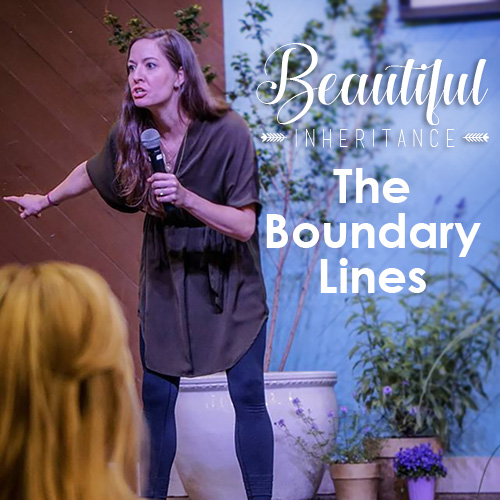Beautiful Inheritance {The Boundary Lines}
 In March 2017, Hope Moms from all across the country, and even from across the globe, gathered in Giddings, TX for the annual Hope Mommies Retreat. Together, they spent the weekend sharing the stories of their precious babies, and finding that Christ can indeed comfort the brokenhearted, often through the hands and tears of another sufferer along the way. The theme of the 2017 retreat was “A Beautiful Inheritance.” In this mini series, Shannon Owen, recaps her messages from the retreat in order to give us a greater picture of the beautiful inheritance we have been given in Christ.
In March 2017, Hope Moms from all across the country, and even from across the globe, gathered in Giddings, TX for the annual Hope Mommies Retreat. Together, they spent the weekend sharing the stories of their precious babies, and finding that Christ can indeed comfort the brokenhearted, often through the hands and tears of another sufferer along the way. The theme of the 2017 retreat was “A Beautiful Inheritance.” In this mini series, Shannon Owen, recaps her messages from the retreat in order to give us a greater picture of the beautiful inheritance we have been given in Christ.
 There are lies about the hard things. I bet you’ve heard them. They use the language of Scripture to make them sound like holy things. But, oh, friend—they are lies and they come to deceive. They sound like this:
There are lies about the hard things. I bet you’ve heard them. They use the language of Scripture to make them sound like holy things. But, oh, friend—they are lies and they come to deceive. They sound like this:
“If you are good enough, God will give you what you want.”
“If you claim the thing you want in prayer, and believe that you have already received it, God has no choice but to give it to you.”
“With enough faith, you can bring physical healing.”
“God will never give you more than you can handle.”
The lies sound like truth, and they sound good because it seems like everything is yours to control. But when devastation comes, those lies do nothing to give peace. The lies only confuse us about the nature of God and give guilt for things that are not your fault. This is not from God.
The thing grief teaches you is that God definitely allows more than we can handle.
There was a man named Horatio Spafford who lost a wife and 5 children. Then, he penned a hymn called “It is Well.” There was a woman named Elisabeth Elliot, whose husband was murdered on a mission trip. Then, she went back to that tribe, told them about Jesus, and wrote a book about it called “Through the Gates of Splendour.” Looking way back into history at one of the most famous martyrs, Joan of Arc was killed for her belief. According to witnesses, she praised God as she stood in the death flames. Her last word is reported to have been “Jesus!”
These are crazy people, right? How can they conceivably say things like this? How can they be sane and turn great sorrow into hope? It’s impossible.
Unless they know something.
David is like this too. He’s writing Psalm 16 in the wilderness, while he’s being hunted by King Saul. And he writes, “The LORD is my chosen portion and my cup; You hold my lot. The lines have fallen for me in pleasant places. Indeed, I have a beautiful inheritance.”
David describes receiving something good from God, even in the middle of an impossible situation. David knows hope. We’ve looked at the inheritance-giver, the Father. Now, let’s take a look at the thing he gives.
In Psalm 16:5, David calls God “my chosen portion,” which is also understood as “the portion of my inheritance.” He also calls God his “cup,” which is usually an image tied to a person’s destiny. In some instances, the cup is negative (for instance, when Jesus prays, “Take this cup from me”). But, not here. God is our portion; He is our future.
Verse 6 alludes to the division of land of Canaan into tribal allocations. It’s the fulfillment of the promise to Abraham. There were 12 tribes of Israel, and 11 of those tribes got land. The Levites, the tribe of priests, inherited only 48 cities. In a time where wealth is in land, if it were me, I would think I got the short end of the stick.
It’s hard, you know? We see “#blessed” written all over the pictures of perfect hospital birth pictures and beautifully staged newborn shots. So, we’re left asking, does this mean that I have no blessing? Is it just loss and heartache and that’s it?
The Levites, with their small physical inheritance, are told this in Numbers 18:20: “And the LORD said to Aaron, ‘You shall have no inheritance in their land, neither shall you have any portion among them. I am your portion and your inheritance among the people of Israel.’”
Like the Levites, we may not have our blessing here. When we’re left with empty arms and hurting hearts, it doesn’t mean that God has nothing to give us.
He gives us Himself.
You might now be asking how does this salve anything? Sure, we get the LORD Himself, but how is that better?
Romans 8:14-18 says, “For all who are led by the Spirit of God are sons of God. For you did not receive the spirit of slavery to fall back into fear, but you have received the Spirit of adoption as sons, by whom we cry, ‘Abba! Father!’ The Spirit himself bears witness with our spirit that we are children of God, and if children, then heirs—heirs of God and fellow heirs with Christ, provided we suffer with him in order that we may also be glorified with him.”
To be a child of God means we can cry “Abba! Father!” He is a good Father, and He is not blind to our suffering.
When we get Him as our inheritance, we benefit from everything He is. Inheritance isn’t just about riches; it’s also about inheriting traits. He is power, He is glory, He is love, He is renewer of all things. The closer we draw to God, the more we recognize His power, His glory, His love utterly transforming our hearts.
Also, we are co-heirs with Christ. Hebrews 1:2 says that Christ is the heir of ALL things. Therefore, we are the heirs of all things (1 Corinthians 3:21-23). That means NOTHING that happens here on earth has the final say over your joy or your hope. Christ conquered everything once and for all—because He is victorious, we can claim victory over the bitterness, the anger, the sinking blackness that tries to usurp our hearts.
When talking about inheritance, the Bible deals directly with suffering. In Romans 8:18, it says that we suffer now for the purpose of future glory. Inheritance of God Himself also means that we have hope in an inheritance of glory.
As 1 Peter 4 reminds us, “Beloved, do not be surprised at the fiery trial when it comes upon you to test you, as though something strange were happening to you. But rejoice insofar as you share in Christ’s sufferings, that you may also rejoice and be glad when glory is revealed.”
Peter reminds us that we live in a broken world; everyone experiences some type of “fiery trial.” We are not alone in our suffering.
There is a gift in loss. As John Piper says, “Suffering is appointed for us in this life as a great mercy to keep us from loving this world more than we should and to rely on God who raises the dead.”
We anchor our hope now in heaven. Because of grief, we long in a different way than we could before our loss. We can look up, and we can mean what we say when we long for heaven.
To “keep on rejoicing” doesn’t mean to be happy or necessarily cheerful about grief. Joy is part of the medicine for endurance. Again, joy is different than cheerfulness. While cheerfulness is the attitude of a moment, joy runs soul-deep.
Suffering works the perseverance of faith. Suffering changes you. In A Grief Observed, C.S. Lewis writes, “God has not been trying an experiment on my faith or love in order to find out their quality. He knew it already. It was I who didn’t.”
You’ll never be the same as you were before loss. And with the God who transforms, you can not only have hope, but you can also give hope.
We are called to be priests (1 Peter 2:9-10). We may not have the story we wanted. We may not love where He has us today. But, we share the story. Like priests, we are to declare the things that He has done.
Share your story. Let others into the messy—they may need to see it.
 Shannon Owen lives in Houston, Texas with her husband, Lee, and their two girls, Avery (6) and Kate (2). In 2012, between her two girls, she miscarried a baby at 8 weeks due to an ectopic pregnancy; read more from Shannon about her Hope Baby here. She taught high school English, but traded in her grammar textbooks for board books after Avery was born. However, words and stories are still very much a part of her life.
Shannon Owen lives in Houston, Texas with her husband, Lee, and their two girls, Avery (6) and Kate (2). In 2012, between her two girls, she miscarried a baby at 8 weeks due to an ectopic pregnancy; read more from Shannon about her Hope Baby here. She taught high school English, but traded in her grammar textbooks for board books after Avery was born. However, words and stories are still very much a part of her life.
During a lengthy NICU stay after her daughter Kate was born, Shannon dusted off her pen and started a blog to keep friends and family updated on Kate’s progress, but kept writing because it was catharsis. Kate was born with a congenital, non-progressive muscle and joint disorder as well as bilateral vocal cord paralysis, which causes a blockage in her airway.
Shannon also writes for Abide, an audio prayer app, and has had some of her reading plans featured on YouVersion. You can find her at shannonowenblogs.com.
Shannon and her family are very involved in their church, Houston’s First Baptist. Shannon and Lee help teach high school juniors and seniors, and Shannon leads and teaches in the women’s ministry.


Got something to say?